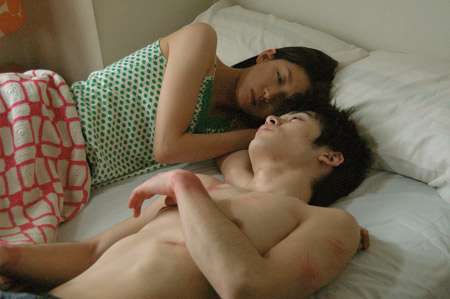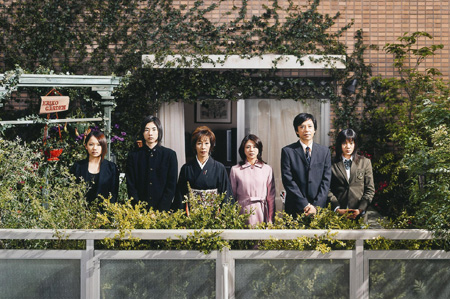FIRES ON THE PLAIN (NOBI) (Kon Ichikawa, 1959)
Japan Society
333 East 47th St. at First Ave.
Friday, December 10, $12, 7:30
Series runs through December 12
212-715-1258
www.japansociety.org
 Kon Ichikawa’s FIRES ON THE PLAIN is one of the most searing, devastating war movies ever made. Loosely based on Shohei Ooka’s 1952 novel and adapted by Ichikawa’s wife, screenwriter Natto Wada, the controversial film stars Eiji Funakoshi as the sad sack Tamura, a somewhat pathetic tubercular soldier on the island of Leyte in the Philippines at the tail end of World War II. After being released from a military hospital, he returns to his platoon, only to be ordered to go back to the hospital so as not to infect the other men. He is also given a grenade and ordered to blow himself up if the hospital refuses him, which it does. But instead of killing himself, Tamura wanders the vast, empty spaces and dense forests, becoming involved in a series of vignettes that range from darkly comic to utterly horrifying. He encounters a romantic Filipino couple hiding salt under their floorboards, a quartet of soldiers stuffed with yams trying to make it alive to a supposed evacuation zone, and a strange duo selling tobacco and eating “monkey” meat. As Tamura grows weaker and weaker, he considers surrendering to U.S. troops, but even that is not a guarantee of safety, as the farther he travels, the more dead bodies he sees. FIRES ON THE PLAIN is a blistering attack on the nature of war and what it does to men, but amid all the bleakness and violence, tiny bits of humanity try desperately to seep through against all the odds. And the odds are not very good.
Kon Ichikawa’s FIRES ON THE PLAIN is one of the most searing, devastating war movies ever made. Loosely based on Shohei Ooka’s 1952 novel and adapted by Ichikawa’s wife, screenwriter Natto Wada, the controversial film stars Eiji Funakoshi as the sad sack Tamura, a somewhat pathetic tubercular soldier on the island of Leyte in the Philippines at the tail end of World War II. After being released from a military hospital, he returns to his platoon, only to be ordered to go back to the hospital so as not to infect the other men. He is also given a grenade and ordered to blow himself up if the hospital refuses him, which it does. But instead of killing himself, Tamura wanders the vast, empty spaces and dense forests, becoming involved in a series of vignettes that range from darkly comic to utterly horrifying. He encounters a romantic Filipino couple hiding salt under their floorboards, a quartet of soldiers stuffed with yams trying to make it alive to a supposed evacuation zone, and a strange duo selling tobacco and eating “monkey” meat. As Tamura grows weaker and weaker, he considers surrendering to U.S. troops, but even that is not a guarantee of safety, as the farther he travels, the more dead bodies he sees. FIRES ON THE PLAIN is a blistering attack on the nature of war and what it does to men, but amid all the bleakness and violence, tiny bits of humanity try desperately to seep through against all the odds. And the odds are not very good.
FIRES ON THE PLAIN begins Japan Society’s weekend-long Shadows of the Rising Sun: Cinema and Empire series, comprising a quartet of Chinese and Japanese films that examine Japan’s futile attempts at creating an empire through war. The impressive lineup includes the New York premiere of Koji Wakamatsu’s CATERPILLAR, being screened on Saturday night at 7:00; Jiang Wen’s 2000 Cannes Grand Prize winner, DEVILS ON THE DOORSTEP, scheduled for Sunday at 4:00; and Nagisa Oshima’s 1983 WWII drama MERRY CHRISTMAS, MR. LAWRENCE, starring David Bowie, Ryuichi Sakamoto, Tom Conti, and Takeshi Kitano, on Sunday at 7:00. FIRES ON THE PLAIN is also part of Japan Society’s Zen & Its Opposite: Essential (& Turbulent) Japanese Art House festival of monthly classics, which continues January 11 with Nobuo Nakagawa’s HELL and February 18 with Kihachi Okamoto’s SWORD OF DOOM.
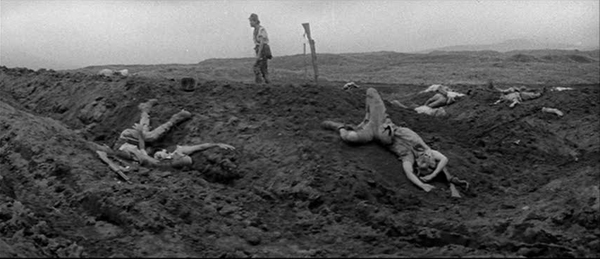
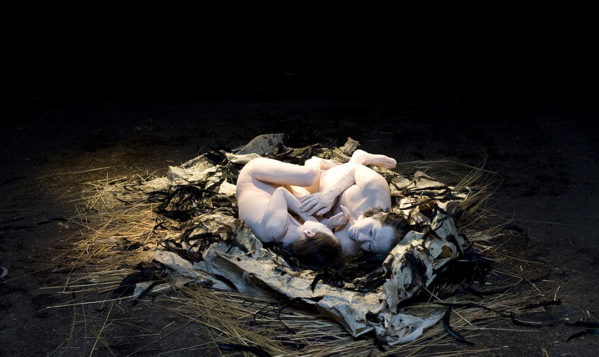
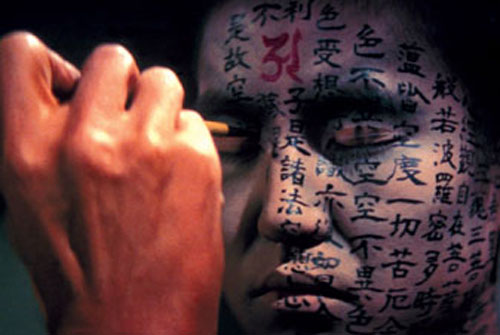
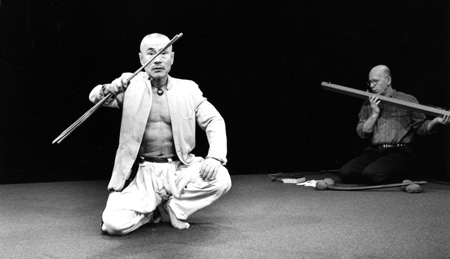
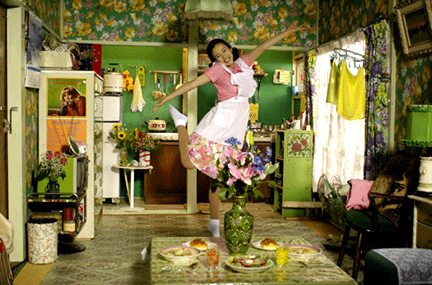
 We called Tetsuya Nakashima’s 2005 hit, KAMIKAZE GIRLS, the “otaku version of Jean-Pierre Jeunet’s AMELIE,” referring to it as “fresh,” “frenetic,” “fast-paced,” and “very funny.” His following film, the stunningly gorgeous MEMORIES OF MATSUKO, also recalls AMELIE and all those other adjectives, albeit with much more sadness. Miki Nakatani stars as Matsuko, a sweet woman who spent her life just looking to be loved but instead found nothing but heartbreak, deception, and physical and emotional abuse. But MEMORIES OF MATSUKO is not a depressing melodrama, even if Nakashima incorporates touches of Douglas Sirk every now and again. The film is drenched in glorious Technicolor, often breaking out into bright and cheerful musical numbers straight out of a 1950s fantasy world. As the movie begins, Matsuko has been found murdered, and her long-estranged brother (Akira Emoto) has sent his son, Sho (Eita), who never knew she existed, to clean out her apartment. As Sho goes through the mess she left behind, the film flashes back to critical moments in Matsuko’s life — and he also meets some crazy characters in the present. It’s difficult rooting for the endearing Matsuko knowing what becomes of her, but Nakashima’s remarkable visual style will grab you and never let go. And like Audrey Tatou in AMELIE, Nakatani — who won a host of Japanese acting awards for her outstanding performance — is just a marvel to watch. The film was shown at the 2007 Japan Cuts festival and is being brought back this year by popular demand.
We called Tetsuya Nakashima’s 2005 hit, KAMIKAZE GIRLS, the “otaku version of Jean-Pierre Jeunet’s AMELIE,” referring to it as “fresh,” “frenetic,” “fast-paced,” and “very funny.” His following film, the stunningly gorgeous MEMORIES OF MATSUKO, also recalls AMELIE and all those other adjectives, albeit with much more sadness. Miki Nakatani stars as Matsuko, a sweet woman who spent her life just looking to be loved but instead found nothing but heartbreak, deception, and physical and emotional abuse. But MEMORIES OF MATSUKO is not a depressing melodrama, even if Nakashima incorporates touches of Douglas Sirk every now and again. The film is drenched in glorious Technicolor, often breaking out into bright and cheerful musical numbers straight out of a 1950s fantasy world. As the movie begins, Matsuko has been found murdered, and her long-estranged brother (Akira Emoto) has sent his son, Sho (Eita), who never knew she existed, to clean out her apartment. As Sho goes through the mess she left behind, the film flashes back to critical moments in Matsuko’s life — and he also meets some crazy characters in the present. It’s difficult rooting for the endearing Matsuko knowing what becomes of her, but Nakashima’s remarkable visual style will grab you and never let go. And like Audrey Tatou in AMELIE, Nakatani — who won a host of Japanese acting awards for her outstanding performance — is just a marvel to watch. The film was shown at the 2007 Japan Cuts festival and is being brought back this year by popular demand.